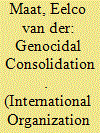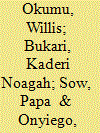|
|
|
Sort Order |
|
|
|
Items / Page
|
|
|
|
|
|
|
| Srl | Item |
| 1 |
ID:
175816


|
|
|
|
|
| Summary/Abstract |
Under conditions of guerrilla conflict, mass indiscriminate violence has been shown to effectively starve a guerrilla of its support. Consequently, counter-guerrilla mass violence is concentrated within territories where a guerrilla is dominant. However, in roughly 40 percent of mass violence episodes (e.g., Rwanda and Cambodia), the violence was aimed at populations within areas of secure territorial control. These episodes have therefore been explained by attributing ideological preferences to leaders or as unique cases only. I argue that leaders adopt mass indiscriminate violence against outgroups to consolidate power under conditions of elite rivalry. The violence serves two main goals. First, it helps build coalitions with constituencies that gain from violence; and second, it targets rival factions indirectly by forcing local security officials to facilitate or oppose the violence. The violence thereby provides rival supporters with an exit option, provides the regime with information on rival supporters’ private loyalties, and undermines rivals’ abilities to mount an effective resistance. These rivals can ultimately be purged from the regime. Based on newly collected original data on elite purges and on the type of mass indiscriminate violence for the years 1950 to 2004, I show that this type of mass violence, which I call “genocidal consolidation,” is intimately connected to authoritarian consolidation.
|
|
|
|
|
|
|
|
|
|
|
|
|
|
|
|
| 2 |
ID:
155008


|
|
|
|
|
| Summary/Abstract |
This paper argues that livestock raids and pastoralists’ competition over water and pastures in north-western Kenya are manifestations of local ethnic political contests and rivalries. The culture of raiding among the Samburu, Turkana, Pokot, Borana, Gabra and Rendille communities has changed over the last 40 years. Whereas elders were once the gatekeepers of communal institutions, today new actors are at the forefront of new forms of violent raids. Among Samburu and Turkana communities, politicians and shrewd businessmen have emerged to exploit ethnic rivalry that exists between these groups and use it to mobilise raids. These political and business elites play influencing roles in raiding by paying and arming warriors to carry out raids. Competition for political influence is closely intertwined with competition over scarce water resources and grazing pastures among Turkana and Samburu. Given that pastoralists survive on decreasing pasture and water resources, our study shows that political elites arm their communities during the dry season to gain the upper hand in contests over access to limited resources. Livestock raids no longer occur in the traditional context of restocking, but rather as an expression and manifestation of local ethnic politics and political contests between ethnic kingpins. The study uses primary field data from a case study collected through in-depth interviews, oral history and group discussions with various actors.
|
|
|
|
|
|
|
|
|
|
|
|
|
|
|
|
|
|
|
|
|